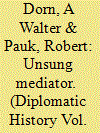|
|
|
Sort Order |
|
|
|
Items / Page
|
|
|
|
|
|
|
| Srl | Item |
| 1 |
ID:
089217


|
|
|
|
|
| Publication |
2009.
|
| Summary/Abstract |
On October 16, 1962, President Kennedy learned that the Soviet Union was building nuclear missile installations in Cuba. For the next six days the president and his advisers secretly deliberated about the American response. The new threat not only upset the nuclear balance but also placed nuclear missiles capable of destroying most U.S. cities on the territory of a new enemy, Premier Fidel Castro. As the Kennedy administration strove to keep this alarming news secret, it nevertheless shared it with the new acting secretary general of the United Nations, a quiet unassuming Burmese diplomat named U Thant.2 Specifically, on Saturday, October 20, 1962, Admiral John McCain, military adviser at the U.S. Mission to the United Nations, informed Thant's military adviser, Major General Indar Jit Rikhye, about the missiles.3 General Rikhye went to the Pentagon for a secret briefing and received an album of U.S. photos of the menacing missiles,4 which he showed to Thant. Two days later, on Monday, October 22, Rikhye informed Thant that Kennedy would be making an important television broadcast that evening concerning the missiles. Thant conferred with the U.S. ambassador to the United Nations, Adlai Stevenson,5 and a few hours later watched Kennedy make one of the most momentous presidential speeches of the century. The president announced a "naval quarantine" of Cuba, pushing the world closer to nuclear war than ever before. In the deepening crisis, the United Nations, and specifically Secretary General Thant, was to play a significant role in de-escalating and then resolving the nuclear standoff between the superpowers. Thant (Figure 1) sent appeals and messages, relayed proposals, offered reassurances, advanced the "noninvasion for missiles" formula that formed the basis of the final agreement, shuttled to Cuba to mollify Castro, and helped secure a verification arrangement.
|
|
|
|
|
|
|
|
|
|
|
|
|
|
|
|
|
|
|
|
|